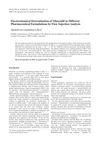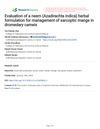 28 citations,
August 2015 in “Journal of Drug Targeting”
28 citations,
August 2015 in “Journal of Drug Targeting” The new CoQ10 gel protects mouse skin better against aging from UV light than the old gel.
21 citations,
January 2010 in “Skin pharmacology and physiology” Special creams can significantly reduce pollen allergens getting into hair follicles.
 18 citations,
March 2014 in “Drug Development and Industrial Pharmacy”
18 citations,
March 2014 in “Drug Development and Industrial Pharmacy” New gel formulas without ethanol and propylene glycol, containing a minoxidil-methyl-β-cyclodextrin complex, have been created for treating hair loss.
 18 citations,
January 2006 in “Analytical Sciences”
18 citations,
January 2006 in “Analytical Sciences” Method accurately measures minoxidil concentration in medicines.
 14 citations,
October 2020 in “Natural Products and Bioprospecting”
14 citations,
October 2020 in “Natural Products and Bioprospecting” Various treatments, including FDA-approved drugs, natural products, and oral supplements, can help with hair loss, but a patient's medical history and potential allergies should be considered when choosing a treatment.
9 citations,
May 2018 in “Photochemistry and photobiology” The Hair BB Cream effectively prevents UV damage and improves hair health.
 8 citations,
March 2020 in “Dermatologic Therapy”
8 citations,
March 2020 in “Dermatologic Therapy” The new hair loss treatment kit was safe and improved hair growth without any adverse effects.
 4 citations,
December 2011 in “Drug Research”
4 citations,
December 2011 in “Drug Research” Two finasteride tablet types are equally effective and can be swapped.
 2 citations,
January 2012 in “Journal of The Chilean Chemical Society”
2 citations,
January 2012 in “Journal of The Chilean Chemical Society” New method accurately measures finasteride in tablets and bulk.
 1 citations,
January 2023 in “Research Square (Research Square)”
1 citations,
January 2023 in “Research Square (Research Square)” A neem-based herbal treatment worked better than ivermectin for sarcoptic mange in camels, improving their recovery and overall health.
 July 2024 in “Annals of Phytomedicine An International Journal”
July 2024 in “Annals of Phytomedicine An International Journal” Herbal ingredients like aloe vera and hibiscus can help with hair problems like hair loss and dandruff.
 May 2024 in “Indian journal of pharmacy and pharmacology”
May 2024 in “Indian journal of pharmacy and pharmacology” Luliconazole is more effective than ketoconazole at repairing damaged hair cuticles.
 February 2024 in “International Journal For Multidisciplinary Research”
February 2024 in “International Journal For Multidisciplinary Research” The herbal hair oil with natural extracts can improve hair health and reduce dandruff.
 January 2024 in “Journal of Evidence-Based Integrative Medicine”
January 2024 in “Journal of Evidence-Based Integrative Medicine” Teak leaf extract may effectively and safely promote hair growth in males with androgenic alopecia.
 December 2023 in “International Journal of Research in Ayurveda and Pharmacy”
December 2023 in “International Journal of Research in Ayurveda and Pharmacy” Ayurvedic remedies may boost immunity and balance in cancer treatment but need more research.
 November 2023 in “International Research Journal of Modernization in Engineering Technology and Science”
November 2023 in “International Research Journal of Modernization in Engineering Technology and Science” Herbal shampoos clean and improve hair naturally without harmful side effects.
 October 2023 in “Plant Archives/Plant archives”
October 2023 in “Plant Archives/Plant archives” Hibiscus rosa-sinensis is effective and safe for use in herbal soaps and hair oils, promoting skin and hair health.
 August 2023 in “International journal of research in Ayurveda and pharmacy”
August 2023 in “International journal of research in Ayurveda and pharmacy” Garudan Kizhangu Ennai may effectively treat alopecia areata but needs more research to confirm its safety and effectiveness.
 August 2023 in “Clinical and Experimental Dermatology”
August 2023 in “Clinical and Experimental Dermatology” The document discusses a special exam case for formulating and using systemic therapy named Athena.
 June 2023 in “Trichology and cosmetology:”
June 2023 in “Trichology and cosmetology:” Ageratum Conyzoides, when taken orally, can effectively reduce hair loss and improve hair growth.
June 2022 in “Research journal of topical and cosmetic sciences” Trichovitals® supplement improves hair thickness, reduces hair loss, and promotes hair growth in young adults.
 March 2021 in “Egyptian Journal of Chemistry”
March 2021 in “Egyptian Journal of Chemistry” The herbal shampoo with Momordica charantia and Hibiscus Rosa-Sinensis is safe and promotes hair growth and scalp health.
 January 2019 in “International Journal of Herbal Medicine”
January 2019 in “International Journal of Herbal Medicine” The polyherbal emulgel created for hair care was safe, had good qualities, and could lead to future hair care products.
March 2023 in “International Journal of Applied Pharmaceutics” The β-sitosterol hair gel is effective and promising for treating hair loss.
 February 2023 in “International Journal of Pharmaceutics”
February 2023 in “International Journal of Pharmaceutics” A new version of minoxidil, a hair loss treatment, was made using nanotechnology. This version, called minoxidil cubosomes, works better and causes fewer skin reactions than the old version. It also penetrates and stays in the skin better, promoting hair regrowth. It's safe and could be a good alternative to current treatments.
 January 2022 in “المجلة العراقية للصيدلة”
January 2022 in “المجلة العراقية للصيدلة” Minoxidil, a hair growth stimulant, is effective in treating hair loss and new formulas like nanoemulsion and nanocarrier systems have improved its delivery.
 February 2016 in “DOAJ (DOAJ: Directory of Open Access Journals)”
February 2016 in “DOAJ (DOAJ: Directory of Open Access Journals)” Finasteride capsules with drug nanoparticles were made, improving stability, solubility, and effectiveness of drugs that don't dissolve well in water.
54 citations,
June 2020 in “Pharmaceutics” New nanocarriers improve drug delivery for disease treatment.
 48 citations,
December 2013 in “Drug Delivery and Translational Research”
48 citations,
December 2013 in “Drug Delivery and Translational Research” Niosomes improve minoxidil skin penetration for hair loss treatment.























